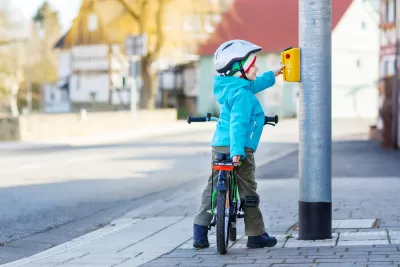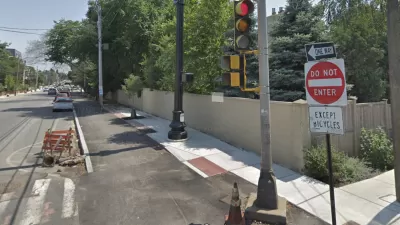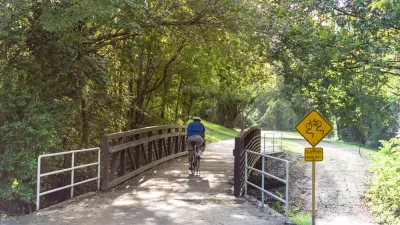A bike plan isn't meant for the peloton. Here's how you can tell.

Chris and Melissa Bruntlett share their take on "a seldom-discussed measure of a city’s bike-friendliness: the speed at which its cyclists travel." Their opinion on the subject is stated thusly: "the slower the people on bikes were moving, the more mature the bicycle culture, and the better the conditions for cycling."
The difference is played out in the difference between what people consider "cyclists" and the rest of us. "Cycling" is considered a sport—one that requires lycra at the lowest levels and performance enhancing drugs at the highest levels. The Bruntletts, however, are more concerned with the rest of us, and they noticed four signifiers that exhibit a mature city for biking: the kinds of people biking, the types of bikes they are riding, the kinds of trips people on bikes are taking, and the kinds of bike infrastructure available in the city. The Bruntletts describe how the first of those four points works:
Upon arrival in a new city, a cursory glance at the types of people choosing to cycle there will tell you a great deal about its bike-friendliness. The places with the widest variety of ages and abilities can be considered – without exception – the most successful, with a greater number of women, children, and seniors on bikes a surefire sign you’re doing something right. That diversity brings with it a slower-paced, more relaxed environment, that is far more welcoming to the “interested but concerned” crowd.
On the last point, according to the Bruntletts, certain types of bike infrastructure are built to ensure that people on bikes feel willing and able to slow down and enjoy the ride. The final twist of this argument: that the first three of those points don't become a reality until the last one does.
FULL STORY: In praise of slow cycling

Planetizen Federal Action Tracker
A weekly monitor of how Trump’s orders and actions are impacting planners and planning in America.

Chicago’s Ghost Rails
Just beneath the surface of the modern city lie the remnants of its expansive early 20th-century streetcar system.

San Antonio and Austin are Fusing Into one Massive Megaregion
The region spanning the two central Texas cities is growing fast, posing challenges for local infrastructure and water supplies.

Since Zion's Shuttles Went Electric “The Smog is Gone”
Visitors to Zion National Park can enjoy the canyon via the nation’s first fully electric park shuttle system.

Trump Distributing DOT Safety Funds at 1/10 Rate of Biden
Funds for Safe Streets and other transportation safety and equity programs are being held up by administrative reviews and conflicts with the Trump administration’s priorities.

German Cities Subsidize Taxis for Women Amid Wave of Violence
Free or low-cost taxi rides can help women navigate cities more safely, but critics say the programs don't address the root causes of violence against women.
Urban Design for Planners 1: Software Tools
This six-course series explores essential urban design concepts using open source software and equips planners with the tools they need to participate fully in the urban design process.
Planning for Universal Design
Learn the tools for implementing Universal Design in planning regulations.
planning NEXT
Appalachian Highlands Housing Partners
Mpact (founded as Rail~Volution)
City of Camden Redevelopment Agency
City of Astoria
City of Portland
City of Laramie





























